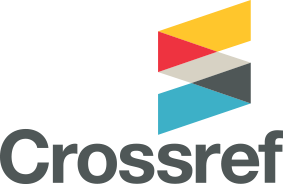Perkembangan dan Faktor-faktor yang Memengaruhi Tingkat Kemandirian Pasien Strok Selama Rawat Inap di Yogyakarta berdasar atas Skor Modifikasi Indeks Barthel
Abstract
Strok adalah gangguan fungsional otak fokal maupun global, bersifat akut, terjadi lebih dari 24 jam, berasal dari gangguan aliran darah otak dan bukan disebabkan oleh gangguan peredaran darah otak. Salah satu dampak dari strok adalah kelemahan anggota gerak baik hemiplegia atau hemiparesis sehingga mengganggu kemandirian pasien dalam aktivitas kehidupan sehari-hari (AKS). Tujuan penelitian ini mengetahui perkembangan tingkat kemandirian pasien strok berdasar atas skor Modifikasi Indeks Barthel serta faktor-faktor yang memengaruhi tingkat kemandirian pasien. Penelitian dilakukan di rumah sakit PKU Muhammadiyah Yogyakarta dan Rumah Sakit PKU Muhammadiyah Gamping pada bulan Mei hingga Juni 2016. Penelitian dilakukan dengan desain prospective longitudinal. Sejumlah 42 responden dipilih melalui accidental sampling. Instrumen yang digunakan adalah kuesioner Modifikasi Indeks Barthel. Data dianalisis dengan regresi logistik berganda. Hasil penelitian menunjukkan untuk pasien strok perdarahan, pada saat masuk rumah sakit mayoritas dengan kondisi tingkat ketergantungan total (44%) dan pada saat keluar sakit sebagian besar menjadi tingkat ketergantungan parah (44%). Untuk pasien dengan strok iskemik, saat masuk rumah sakit mayoritas juga berada pada tingkat ketergantungan total (49%) dan terjadi perbaikan kondisi menjadi tingkat ketergantungan parah (42%) pada saat keluar rumah sakit. Variabel lama rawat inap berhubungan secara signifikan terhadap skor Modifikasi Indeks Barthel (p<0,05). Tidak ada faktor yang paling dominan berpengaruh terhadap skor Modifikasi Indeks Barthel pasien strok.
Kata kunci: Aktivitas kehidupan sehari-hari, modifikasi indeks barthel, strok
Development and Factors Affecting the Level of Independence of Stroke Patients During Hospitalization in Yogyakarta based on Modified Barthel Index Score
Stroke is a focal or global brain functional disorder which occur more than 24 hours and originating from a disruption of cerebral blood flow which is not caused by cerebral circulatory disorders. Consequences of stroke are extremity disability, hemiplegia, or hemiparesis. Furthermore, stroke makes it difficult for patients to do activities of daily life (ADL). The aim of this study was to determine the DLA independency level of stroke patient based on the Modified of Barthel Index score and to analyze the determinants that affect patient’s dependency level. The study was conducted at PKU Muhammadiyah Yogyakarta Hospital and PKU Muhammadiyah Gamping Hospital in May to June 2016. This was a prospective longitudinal study on forty two respondents selected through accidental sampling. Barthel Index Modification instrument was used to measure the ADL independency level. Data were analyzed by multiple logistic regression. Majority of hemorrhagic stroke patients had total dependency when they were admitted to hospital (44.4%) which improved to moderate dependency when they were discharged (44.4%). Meanwhile, ischemic stroke patients were in total dependency the first time they came to hospital (44.4%) and they also improved to severe dependency at discharge (42.4%). Length of hospital stay has a significant correlation with Barthel Index score (p<0.05). None of the variables affects the Modified of Barthel Index score dominantly.
Key words: Activities of daily living, modified of barthel index, stroke
Keywords
Full Text:
PDFReferences
World Health Organization (WHO). Global status report on non-communicabel diseases. Geneva: WHO Press; 2014.
Woodward M, Tsukinoki-Murakami R, Murakami Y, Suh I, Fang X, Ueshima H. The epidemiology of strok amongst women in the Asia-Pacific region. Womens Heal (l Engl). 2011;7:305–17.
Kementerian Kesehatan Republik Indonesia. Laporan nasional riset kesehatan dasar 2018. Jakarta: DepKes RI; 2018.
Langhorne P, Bernhardt J, Kwakkel G. Strok rehabilitation. The Lancet. 2011;377(9778): 1693-1702. Tersedia dari: http://dx.doi.org/10.1016/S0140-6736(11)60325-5.
Miller EL, Murray L, Richards L, Zorowitz RD, Bakas T, Clark P. Comprehensive overview of nursing and interdisciplinary rehabilitation care of the strok patient: a scientific statement from the American Heart Association. Strok. 2010;41:2402–48.
Guajardo VD, Terroni L, Sobreiro MDFM, Zerbini MIDS, Tinone G, Scaff M, dkk. The Influence of depressive symptoms on quality of life after strok: a prospective study. J Strok Cerebrovasc Dis. 2014;22(1):201–9.
Žikic RT, Divjak I, Jovićević M, Semnic M, Slankamenac P, Žarkov M, dkk. The effect of post strok depression on functional outcome and quality of life. Acta Clin Croat. 2014;53(3):294–301.
Parekh I, Rhoda A. Functional Outcomes of Strok patients admitted to a tertiary hospital in Western Cape, South Africa. South Africa J Physiother. 2013;69(2):10–4.
Ghazali SE, Zulkifly MFM, Din NC, Desa A, Ali RA. Hubungan antara faktor demografik dan klinikal dengan kefungsian fizikal pesakit strok. Sains Kesihat Malaysia. 2016; 14(2):23–30.
Lutz B, Young M. Rethinking intervention strategies in strok family caregiving. Rehabil Nurs. 2010;35(4):152–60.
Hartati J. Hubungan tingkat pengetahuan dengan perilaku family caregiving dalam merawat pasien paska strok di rumah. UIN Syarif Hidayatullah; 2012. Tersedia dari: http://repository.uinjkt.ac.id
Bjartmarz I, Jónsdóttir H, Hafsteinsdóttir TB. Implementation and feasibility of the strok nursing guideline in the care of patients with strok: A mixed methods study. BMC Nurs. 2017;16(1):1–18.
Aadal L, Angel S, Dreyer P, Langhorn L, Pedersen BB. Nursing roles and functions in the inpatient neurorehabilitation of strok patients: a literature review. J Neurosci Nurs. 2013;45(3):158–70.
National Strok Foundation (NSF). Clinical guidelines for strok management; a quick guide for nursing. Melbourne; 2010. hlm. 78–95.
Kelloway L, Kras-Dupuis A, Martin-Gaspar C, Whiteman R, O’Farrell B, Maclsaac L, dkk. Strok assessment across the continuum of care: guideline supplement. Ontario: Registered Nurse Association of Ontario; 2011.
Supraptiningsih. Reliabilitas modifikasi indeks barthel pada penderita strok. [disertasi] Yogyakarta: Universitas Gadjah Mada; 1993.
McCormack J, Reay H. Acute strok research: challenges and opportunities for nurses. Nurs Stand. 2013;27(32):39–45.
Carlo A Di, Lamassa M, Franceschini M, Bovis F, Cecconi L, Pournajaf S, dkk. Impact of acute-phase complications and interventions on 6-month survival after strok. A prospective observational study. PLoS One. 2018;13(3):1–16.
Pinzon R. AWAS strok! pengertian, gejala, tindakan, perawatan, dan pencegahan. Yogyakarta: Andi; 2010.
Junaidi I. Strok: waspadai ancamannya. Yogyakarta: Andi Offset; 2011.
DOI: https://doi.org/10.15395/mkb.v50n4.1427
Article Metrics
Abstract view : 4540 timesPDF - 3057 times

This work is licensed under a Creative Commons Attribution-NonCommercial 4.0 International License.

MKB is licensed under a Creative Commons Attribution-NonCommercial 4.0 International License
View My Stats







